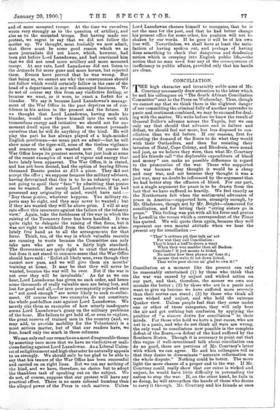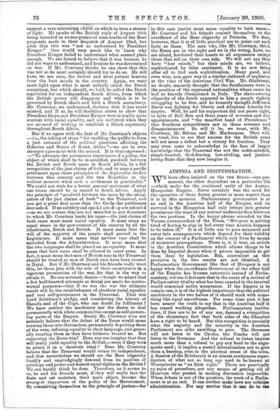CONCILIATION.
THE high character and invariably noble aims of Mr. Courtney necessarily draw attention to the letter which he and his colleagues on "The South African Conciliation Committee" sent to the Press on Wednesday. Thus, though we cannot say that we think there is the slightest danger of our committing the criminal folly of another surrender to panic and sentiment combined, we may be excused for deal- ing with the matter. We write before we know the result of General Buller's advance across the Tugela, but we can only say that should that advance end in failure and defeat, we should feel not more, but less disposed to con- ciliation than we did before. If our reasons, first for resisting the demand of the Boers to do what they would with their Outlanders, and then for resisting their invasion of Natal, Cape Colony, and Rhodesia, were sound and just, as we believe they were, then what Mr. Courtney and his friends call "the deplorable expenditure of blood and money" can make no possible difference in regard to the prosecution of the war. Those who supported the war because they thought it would be a cheap and easy war, and not because they thought it was a just war, may no doubt be influenced by the argument that we had better stop the effusion of blood. For our part, not a single argument for peace is to be drawn from the fact that we have suffered so heavily. We feel exactly as the Northerners felt when the sentimental advocates of peace in America—supported here, strangely enough, by Mr. Gladstone, though not by Mr. Bright—clamoured for conciliation, and for letting their "erring sisters go in peace." This feeling was put with all his force and genius by Lowell in the verses which a correspondent of the Times has quoted. We will quote them again, because they well represent our own mental attitude when we hear the present cry for conciliation :— "Ther"s critters yit that talk an' act
Per wat they call Conciliation:
They'd hand a bafrlo-drove a tract
When they vraz madder than all Bashan.
Conciliate ? it jest means be kicked,
No matter how they phrase an' tone it ; It means that we're to set down licked, That we're poor shotes an' glad to own it!"
Conciliation at a moment like the present can only be reasonably entertained (1) by those who think that the war was caused by unjust and wicked action on our part, and that, therefore, the sooner we own our mistake the better ; (2) by those who are in a panic and want to give up because we have suffered more severely than their nerves can stand ; (3) by those who think all wars wicked and unjust, and who hold the extreme Quaker view. Unless people feel that they come under one or other of these categories, they will only beat the air and get nothing but confusion by applying the poultice of "a. sincere desire for conciliation" to their minds. For those who hold we have a just cause, who are not in a panic, and who do not think all wars are wrong, the only road to conciliation now possible is the complete defeat of the Boers,—a defeat of the kind suffered by the Southern States. Though it is necessary to point out that this vague if well-intentioned talk about conciliation can do no good, there are portions of Mr. Courtney's letter with which we can agree. He and his colleagues tell us that they desire to disseminate " accurate information on the whole dispute." Nothing could be better. The more light the more chance of a proper end to the war. If Mr. Courtney could really show that our cause is wicked and unjust, he would have little difficulty in persuading the nation to stop the war. If, on the other hand, he fails in so doing, he will strengthen the hands of those who desire to carry it through. Mr. Courtney and his friends at once suggest a very interesting obkdt on which to turn a stream of light. He speaks of the British reply of August 28th being intended as an acceptance of nine-tenths of the Boer proposals made in their despatch of August 22nd, but adds that this was "not so understood by President Kruger." One would very much like to know why President Kruger failed to understand what seemed plain enough. We are forced to believe that it was because he did not want to understand, and because he was determined on war. If Mr. Courtney thinks he can show that this was not so he most certainly should try to do so. He will have, we are sure, the fairest and most patient hearing from the best minds in the country. Again, we want more light upon what is most unfairly called the Dutch conspiracy, but which should, we hold, be called the Dutch aspiration for an independent South Africa, from which the British power will disappear and which is to be governed by Dutch ideals and with a Dutch ascendency. Mr. Courtney, we understand, declares that it has never existed, and if so, he will doubtless strive to show that President Steyn and President Kruger were in reality quite content with racial equality, and are maligned when they are accused of wishing to establish a Dutch supremacy throughout South Africa.
But if we agree with the first of Mr. Courtney's objects —i.e., the taking of steps "for enabling the public to form a just estimate of the political questions affecting the Colonies and States of South Africa "—we are in even stronger agreement with the second. It is thus expressed : —" To advocate the paramount importance of a policy, the object of which shall be to re-establish goodwill between the British and Dutch races in South Africa, by a full recognition of the just claims of both, and to urge a pacific settlement upon these principles of the deplorable conflict between this country and the two Republics at the earliest moment when such a settlement is practicable." We could not wish for a better general statement of what our ideals should be in regard to South Africa. Apply the principle of "goodwill between the races by the recog- nition of the just claims of both" to the Transvaal, and you get a great deal more than the Outlander petitioners ever asked. If no subtlety and special pleading are intended —as we are certain they are not intended in any document to which Mr. Courtney lends his name—the just claims of both races must mean racial equality. It must mean an equal share in the government of the country by all the inhabitants, Dutch and British. It must mean that the will of the majority of the people shall prevail in the Legislature. It must mean that neither race shall be excluded from the Administration. It must mean that the two languages shall be placed on an equality. It must mean that both races shall be allowed to carry arms. In fact, it must mean that men of British race in the Transvaal should be treated as men of Dutch race have been treated in Natal. But if Mr. Courtney and his friends really want this, let them join with the rest of their countrymen in a vigorous prosecution of the war, for that is the way to obtain it. No one seriously denies—though we admit that a few half-hearted attempts at denial are made for contro- versial purposes—that if we win the war the ultimate result will be the establishment of absolute racial equality and real self-government in the Transvaal. That was Lord Salisbury's pledge, and considering the history of Canada and of the Gape, who can doubt its fulfilment? We have neither the machinery nor the desire to deal permanently with white communities except as self-govern- ing parts of the Empire. Surely Mr. Courtney does not seriously believe that the defeat of the Boers would mean turning them into Outlanders, permanently depriving them of the vote, refusing equality to their langaage, and gener- ally treating them as they have hitherto treated us. But supposing the Boers win? Does any one imagine that they will really yield equality to the British,—even if they were to admit it as a theoretic ideal ? Does Mr. Courtney believe that the Transvaal would retain its independence, and that nevertheless we should see the Boer oligarchy frankly and ungrudgingly descend from its position of privilege and power and bestow equal rights on the British? We can hardly think he does. Therefore, as it seems to us, he and his friends must, if they will really face the facts and yet maintain their main object, become the strongest supporters of the policy of the Government. By committing themselves to the principle of justice—for in this case justice must mean equality to both races—. Mr. Courtney and his friends commit themselves to the overthrow of the Boer oligarchy at Pretoria. We fear, however, that it is of little practical use to point out such facts as these. The men who, like Mr. Courtney, think the Boers are in the right and we in the wrong, have, we are afraid, hardened their hearts to all arguments except those that tell on their own side. We will not say they have "lost minds," but their minds are, we believe, sophisticated by false sentiment. It is no new thing after all to find such sophistication. Many good, and even wise, men gave way to a similar outbreak of sophistry at the time of the American Civil War. Mr. Gladstone, no doubt, sincerely thought that the Southerners were in the position of the oppressed nationalities whose cause he had so bravely championed in Italy. The slave-owning oligarchy of the South appeared to him a people rightly struggling to be free, and he honestly thought Jefferson Davis was fighting for liberty and Abraham Lincoln for empire. Well, he and his supporters did not prove right, in spite of Bull Run and three years of reverses and dis- appointments, and "the manifest hand of Providence" that Southern sympathisers saw in those reverses and disappointments. So will it be, we trust, with Mr. Courtney, Mr. Selous, and Mr. Mackarness. They will, we trust, live to see that success for the British arms will not mean a defeat but a victory for freedom. They may even come to acknowledge in the face of larger knowledge that the Transvaal was not the noble-minded, simple-hearted, God-fearing, law-abiding, and justice- loving State that they now imagine it.







































 Previous page
Previous page